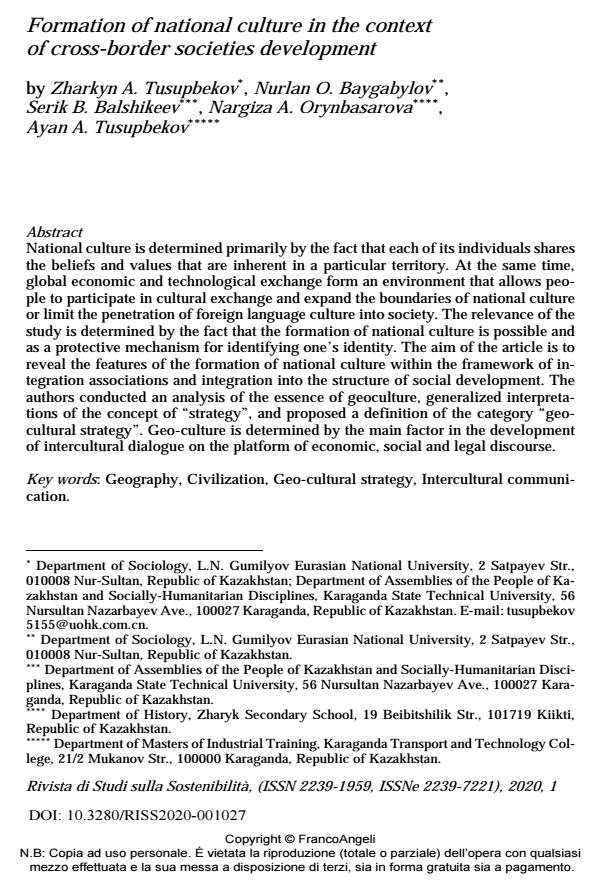Formation of national culture in the context of cross-border societies development
Journal title RIVISTA DI STUDI SULLA SOSTENIBILITA'
Author/s Zharkyn A. Tusupbekov, Nurlan O. Baygabylov, Serik B. Balshikeev, Nargiza A. Orynbasarova, Ayan A. Tusupbekov
Publishing Year 2020 Issue 2020/1
Language English Pages 20 P. 459-478 File size 140 KB
DOI 10.3280/RISS2020-001027
DOI is like a bar code for intellectual property: to have more infomation
click here
Below, you can see the article first page
If you want to buy this article in PDF format, you can do it, following the instructions to buy download credits

FrancoAngeli is member of Publishers International Linking Association, Inc (PILA), a not-for-profit association which run the CrossRef service enabling links to and from online scholarly content.
National culture is determined primarily by the fact that each of its individuals shares the beliefs and values that are inherent in a particular territory. At the same time, global economic and technological exchange form an environment that al-lows people to participate in cultural exchange and expand the boundaries of national culture or limit the penetration of foreign language culture into society. The relevance of the study is determined by the fact that the formation of national cul-ture is possible and as a protective mechanism for identifying one’s identity. The aim of the article is to reveal the features of the formation of national culture with-in the framework of integration associations and integration into the structure of social development. The authors conducted an analysis of the essence of geocul-ture, generalized interpretations of the concept of "strategy", and proposed a defi-nition of the category "geocultural strategy". Geo-culture is determined by the main factor in the development of intercultural dialogue on the platform of economic, social and legal discourse.
Keywords: Geography, Civilization, Geocultural strategy, Intercultural communication.
- Methodological limitations of sociocultural studies of law Sergey Borisovich Zinkovsky, G.I. Muromtsev, S.B. Zinkovskii, in SHS Web of Conferences /2021 pp.01008
DOI: 10.1051/shsconf/202111801008
Zharkyn A. Tusupbekov, Nurlan O. Baygabylov, Serik B. Balshikeev, Nargiza A. Orynbasarova, Ayan A. Tusupbekov, Formation of national culture in the context of cross-border societies development in "RIVISTA DI STUDI SULLA SOSTENIBILITA'" 1/2020, pp 459-478, DOI: 10.3280/RISS2020-001027